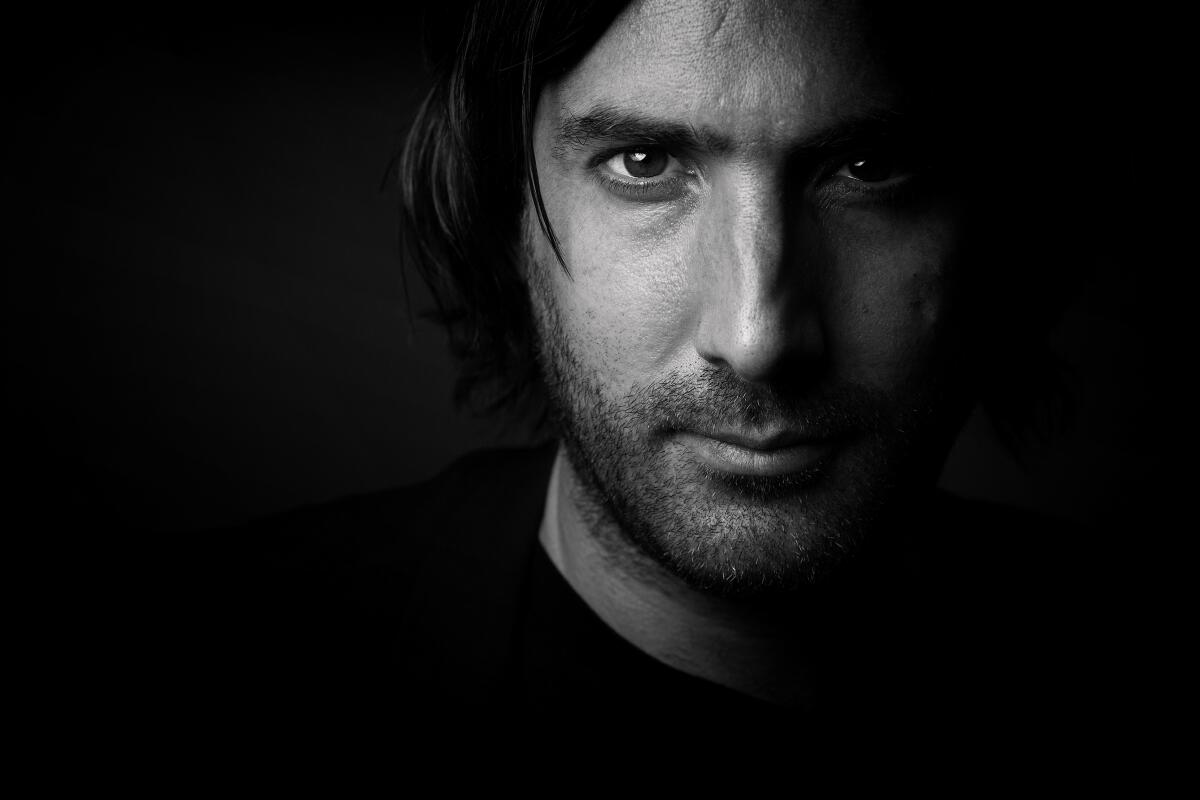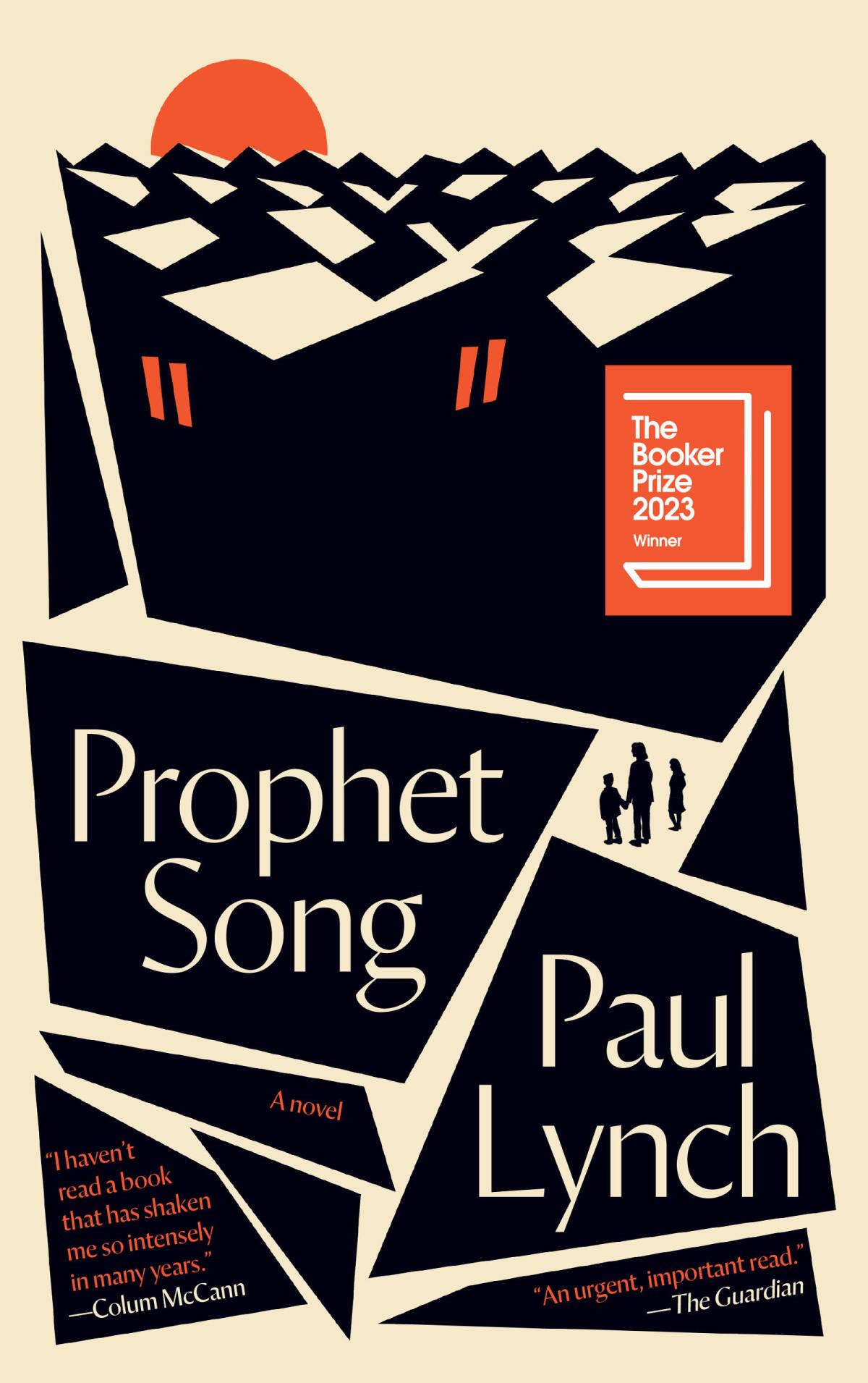This year’s Booker Prize novel imagines a fascist Ireland. Yes, it can happen there too

- Share via
Review
Prophet Song
By Paul Lynch
Atlantic Monthly: 320 pages, $26
If you buy books linked on our site, The Times may earn a commission from Bookshop.org, whose fees support independent bookstores.
Imagine yourself walking through a summer meadow flooded with sunlight and filled with sweet birdsong. Life is good. At the edge of the meadow, you follow a path into the woods. The first thing you notice is the drop in temperature and the dimming of the light. You want to go back into the sunshine, but the path behind has closed. The only way left for you to go is forward, into darkness and uncertainty.
Many fairy tales and horror stories begin this way. In Paul Lynch’s novel, “Prophet Song,” the happy life of a Dublin family is blotted out by the ascension of a far-right government.
Historically, it’s been difficult to imagine the rise of such a party in Ireland, with its stable, largely centrist government. But in mid-November, right-wing violence broke out in the streets of Dublin. Anti-immigrant yobs rampaged after three children were stabbed, blaming immigrants as they vandalized businesses and battled with police. In a country that has encouraged and welcomed immigrants even as its neighbor, the U.K., has punished those seeking refuge, the Dublin riots came as a shock.
More than 20 years after the official end of Northern Ireland’s civil war, conflicts still simmer — and a potent, page-turning genre takes stock.
Lynch was awarded the 2023 Booker Prize on the same weekend as the riots in his home country, making his novel feel prescient in eerie ways. Perhaps, to paraphrase Sinclair Lewis, it could happen there.
The book begins as Eilish Stack, baby in her arms, opens her door to find two policemen from the Garda National Services Bureau. They are looking for her husband, Larry, who is the deputy general secretary of the powerful Teachers’ Union of Ireland. Eilish is frightened, but when Larry returns later he dismisses her fears, blustering that he won’t “hop, skip, and jump” to the commands of the “GNSB.” But the traditional political order no longer works. When he does show up for his appointment, he, along with hundreds of other people, are arrested and disappeared.

Part of the power of Lynch’s novel, especially its ability to compel the reader forward, lies in its structure. The book is told from Eilish’s perspective without paragraph breaks, so that there’s no chance to take a breath as we follow her into the darkness. We have fully inhabited the consciousness of a woman overburdened with an infant and three older children, a declining father and a challenging corporate job.
Whatever else weighs her down, she must meet the moment or her family will unravel. But at first she longs only for the past, a time when she relished the “happiness [that] hides in the humdrum.” In denial, she is confronted by her angry father, who lectures her:
“[W]e belong to a tradition but tradition is nothing more than what everyone can agree on — the scientists, the teachers, the institutions, if you change ownership of the institutions then you can change ownership of the facts, you can alter the structure of belief, what is agreed upon, that is what they are doing, Eilish, it is really quite simple, the NAP is trying to change what you and I call reality, they want to muddy it like water, if you say one thing is another thing and you say it enough times, then it must be so, and if you keep saying it over and over people accept it as true — this is an old idea, of course, it really is nothing new, but you’re watching it happen in your own time and not in a book.”
For 20 years, Claire Keegan has been changing how we read and publish short stories. Her new book, ‘So Late in the Day,’ affirms what makes her great
It is a book, of course, one in a deep tradition. But to call it dystopian or speculative would be to deny that this scenario is daily reality in repressive regimes. The book could have easily been set during the 1970s or 1980s under fascist-leaning regimes in Chile, Argentina or Central America, or narrated by a present-day victim of police violence. Far-right leaders now control a patchwork of European nations from the Netherlands to Turkey. In the U.S. we face worries that the next election may be the last. This isn’t exactly speculation. Those dark woods are nearer than we’d like to think.
“Prophet Song,” is, however, a horror story, with the new political order serving as the monster now inside the house. Yet Eilish cannot kill it by shooting it or chopping off its head. She is a different kind of “final girl.” She isn’t a bureaucratic Winston Smith or a distant observer, but a sandwich-generation woman — a breadwinner tasked with sustaining her father and children even as she searches for her husband.
The novel’s sense of claustrophobia and dread left me afraid to turn off the light. The tropes of dystopian fiction should have led me to anticipate Lynch’s next move, but his skill as a writer unmoored me — as did the familiarity of Eilish’s modern life.
This does not mean her choices are predictable or “relatable.” Lynch seems well aware that many readers will grow frustrated that Eilish doesn’t simply flee — which her sister, safe in Canada, implores her to do. From the outside, that kind of radical break seems straightforward and logical.
Speculative novelist Sandra Newman recast’s ‘1984’ (with the blessing of George Orwell’s estate) as ‘Julia,’ a feminist spin on the dystopian classic.
Through Eilish, the author exposes us for the back-seat drivers we are — and implicitly asks what we plan to do if the improbable becomes the inevitable. “History is a silent record of people who could not leave,” Eilish says, “it is a record of those who did not have a choice, you cannot leave when you have nowhere to go and have not the means to go there, you cannot leave when your children cannot get a passport, cannot go when your feet are rooted in the earth and to leave means tearing off your feet.”
This is not a book that presents political oppression as an intellectual problem to be anticipated or solved. It aims for the limbic system, and it does not miss.
Berry writes for a number of publications and tweets @BerryFLW.
More to Read
Sign up for our Book Club newsletter
Get the latest news, events and more from the Los Angeles Times Book Club, and help us get L.A. reading and talking.
You may occasionally receive promotional content from the Los Angeles Times.








